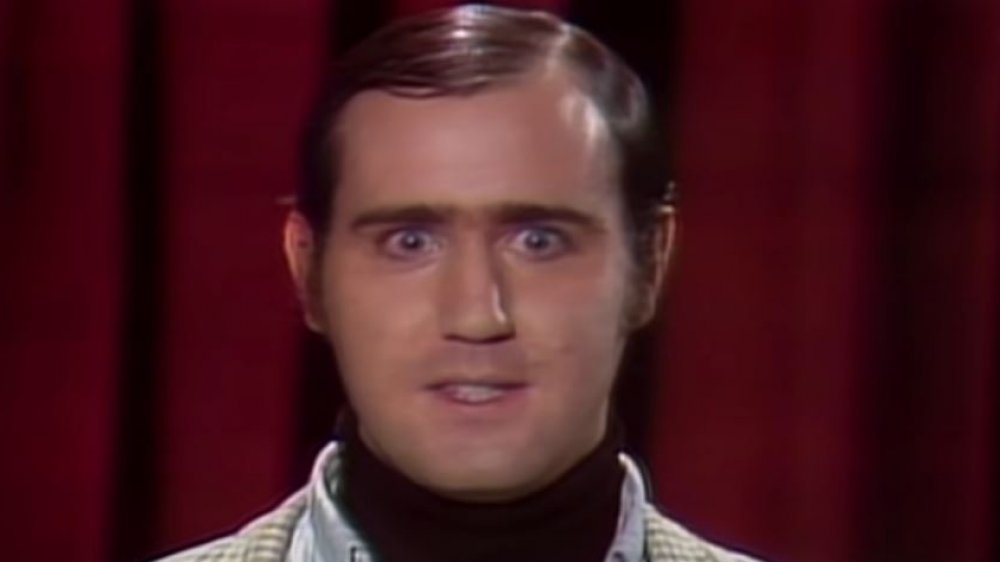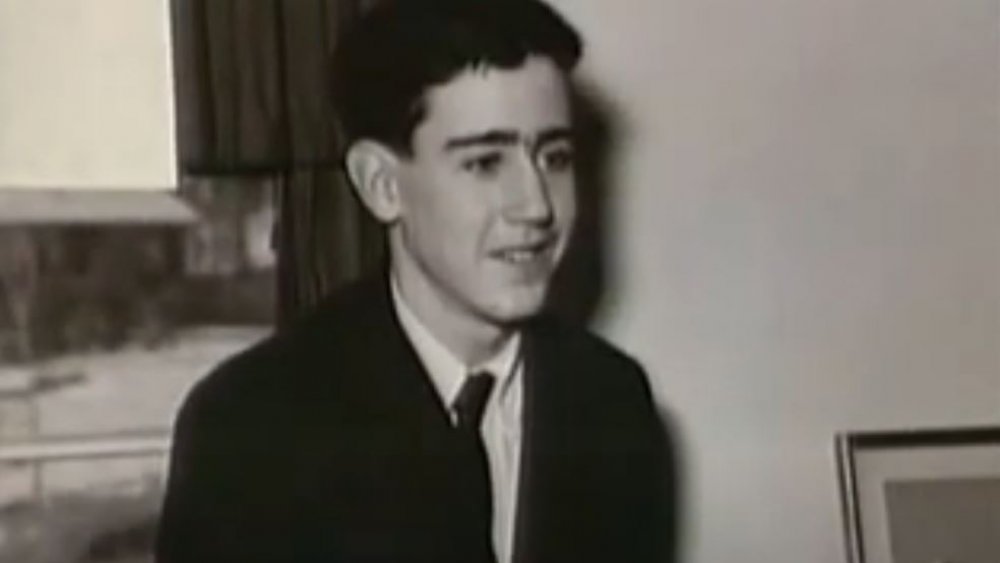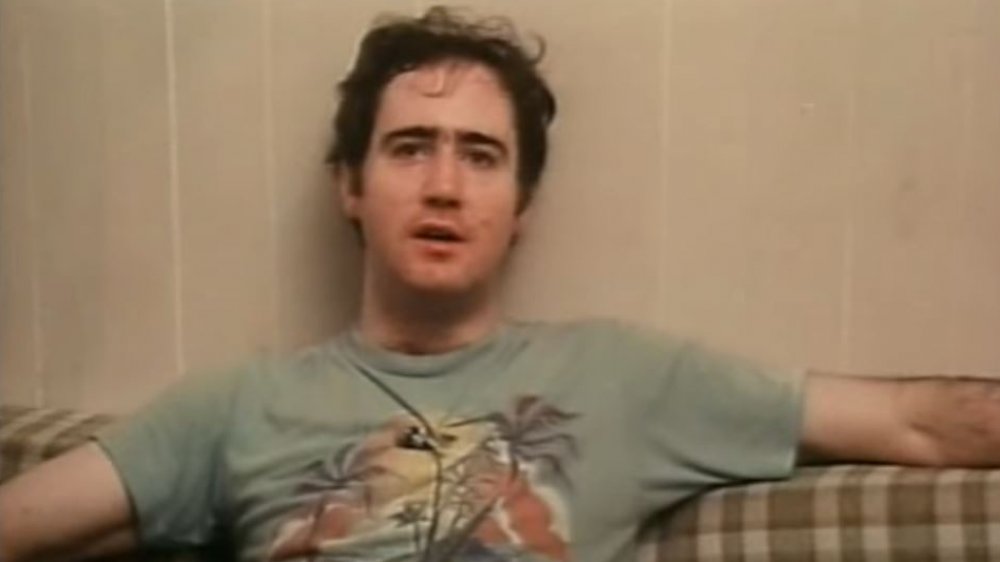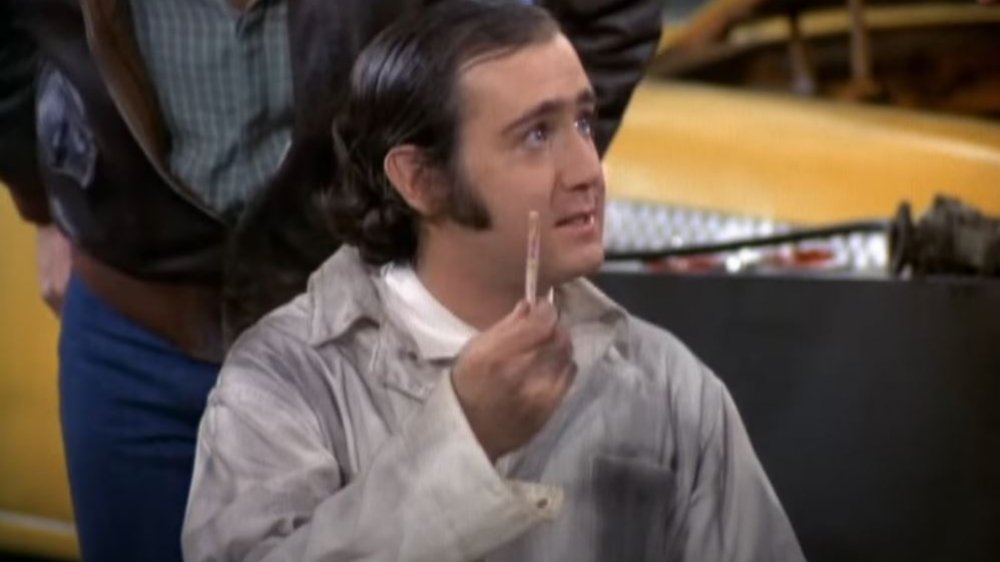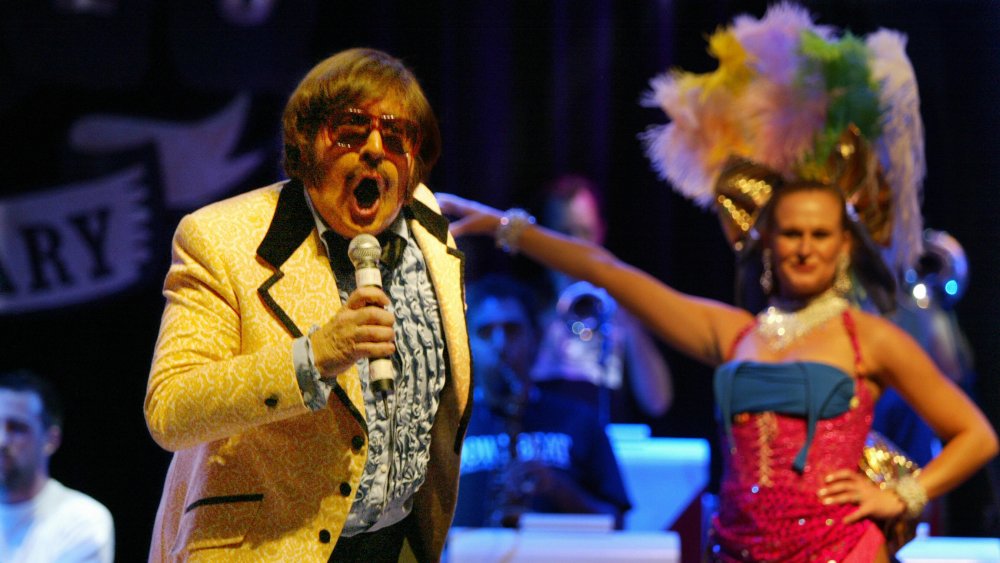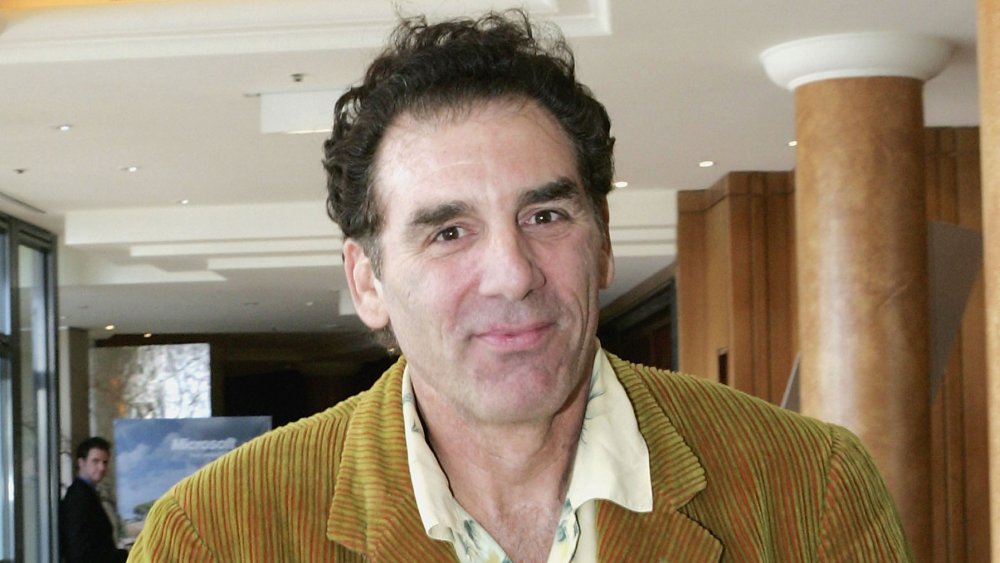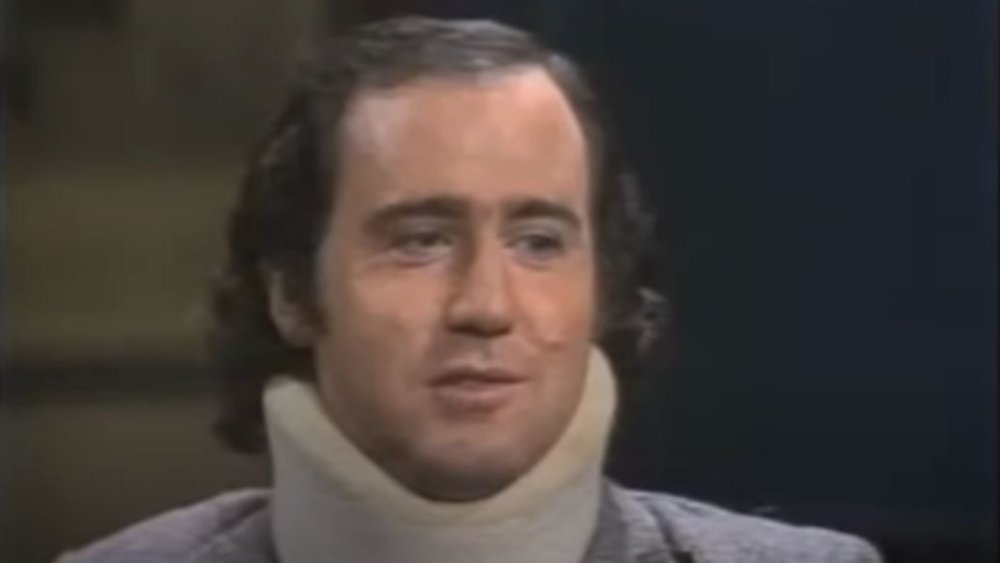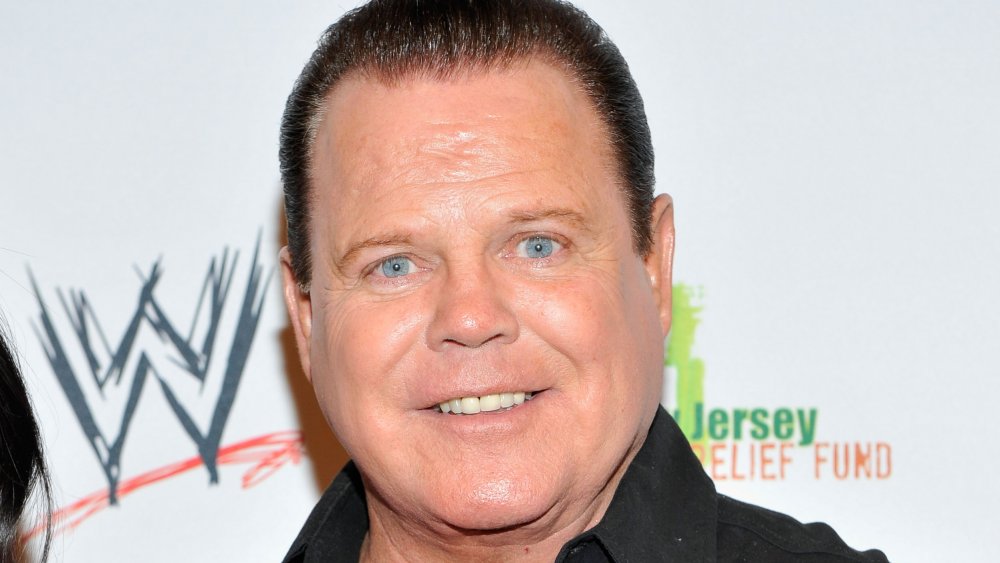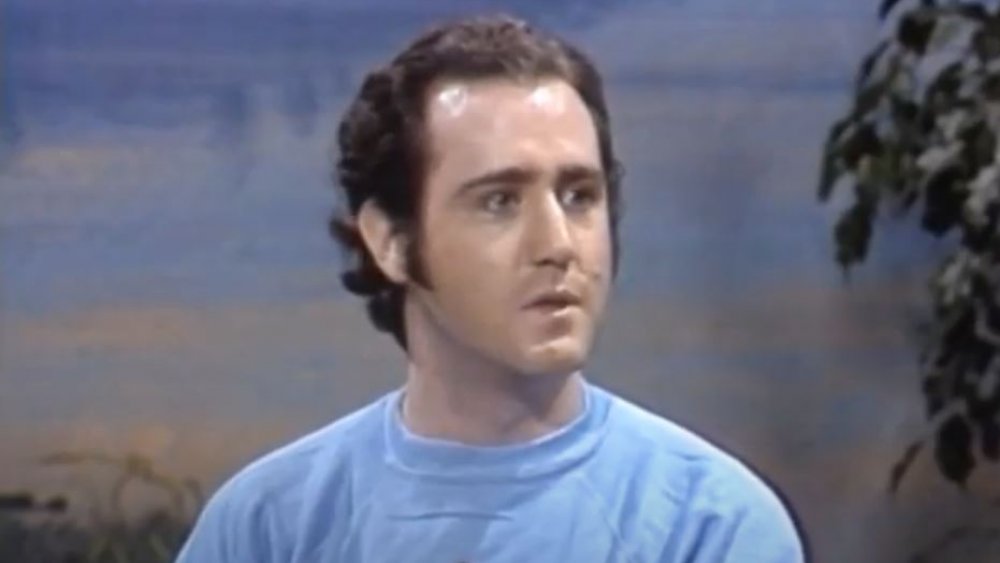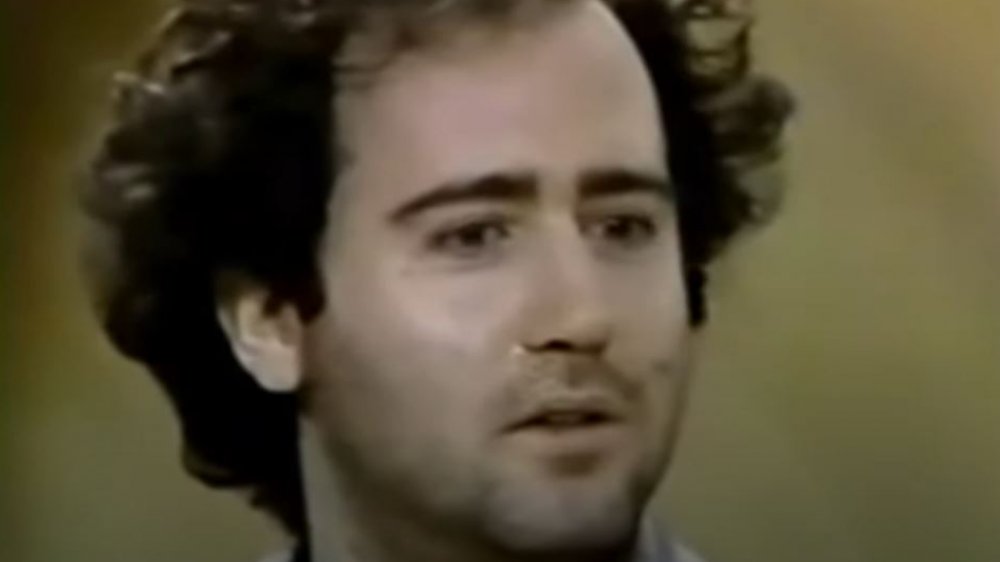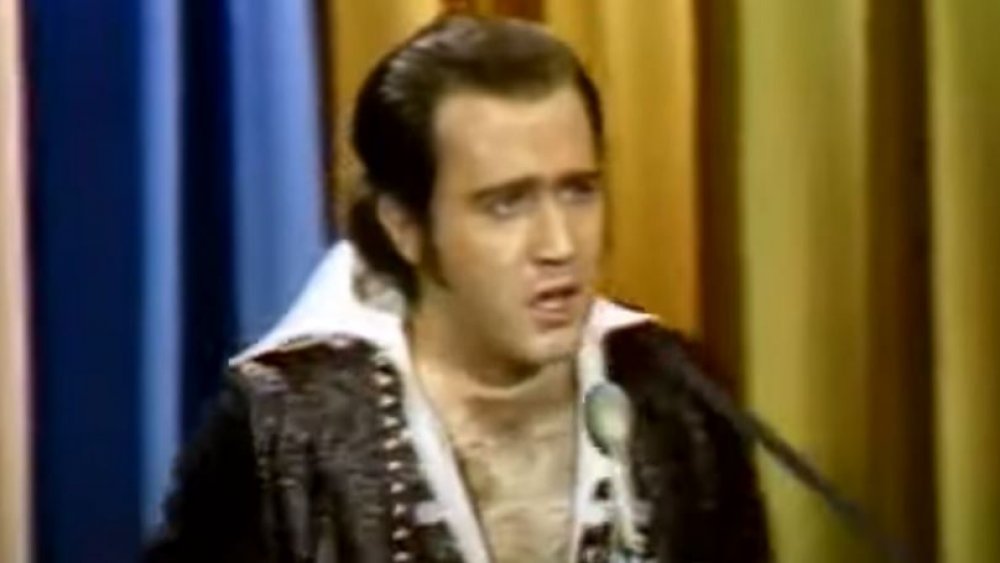The Tragic Real-Life Story Of Andy Kaufman
While Andy Kaufman was one of the most venerated comedians of the 20th century, it should be noted that he certainly never would have seen himself that way. As far as Kaufman was concerned, actually, he wasn't a comedian at all. Comedians told jokes, which Kaufman argued he didn't, preferring to classify himself as an "entertainer."
One thing is for sure, though: Andy Kaufman was a true original, and while he inspired a generation of comics, there has never been anyone else like him. Whether you were introduced to Kaufman through stand-up, his performance as Latka Gravas on Taxi, or Jim Carrey's loving depiction of him on Man in the Moon, there's no disputing that the self-proclaimed entertainer was a raw onion that only got weirder the more you peeled it. While Kaufman's life ended in tragedy — or did it? — the stories he created on the way there are unforgettable.
Even as a kid, Andy Kaufman loved to entertain
A dyed-in-the-wool New Yorker, Andy Kaufman grew up in a middle-class Jewish family. Despite his shy tendencies, by the age of eight, he had already become passionate about making people laugh: When he wasn't doing make-believe TV shows in his bedroom, according to Biography, he was performing stand-up at birthday parties. As pointed out by AndyKaufman.com, it was in these early years that Kaufman first donned his father's jacket and developed his famous "Foreign Man" character, mostly to entertain his younger sister.
Kaufman struggled in high school, according to Bill Zehme's biography Lost in the Funhouse, but kept going largely to please his father. After graduating in 1967, he could have been drafted into the Vietnam War, but following a psychological evaluation, received a permanent 4-F deferment. The reason? A letter from the doctor claimed that Kaufman had lived "in a fantasy world since preschool days," completely disconnected from reality, and that if he were ever put in the military, he would "lose his mind." Kaufman, for the record, absolutely loved this letter. He proudly displayed it to all his buddies, who knew full-well that Kaufman had purposely treated his psych evaluations as a high-stakes joke. As friend Gil Gevins said, "He was aware that it was all this kind of game that he played. He knew what he was doing — not all the time, but a lot of the time. He just encouraged people to believe what they wanted."
Andy Kaufman's career track was weird from the beginning
Once high school was in Andy Kaufman's rearview mirror, he launched toward his dreams and began studying television at a junior college in Boston, Massachusetts. Even back then, the precise nature of what he did, exactly, was always vague. From his earliest years on the stage, he rejected the title of "comedian," according to Encyclopedia Britannica, instead always calling himself an "entertainer" and even claiming that he had never told a single joke onstage. Exaggeration? Nah. While any other comedian making such a boast would sound crazy, Andy Kaufman knew what he was doing.
Anyhow, while in Boston, he entertained his classmates by hosting a strange campus TV program called Uncle Andy's Fun House. Following this stage in his life, he jetted back down to New York City and started trying his hand at the local comedy clubs. It was in 1971, according to Biography, that Kaufman caught his big break, when he was spotted by Budd Friedman, the owner of the Improvisation Comedy Club, who took the chance of booking him for future acts. To Kaufman's credit, he never toned down his style and kept winning new fans until, in 1974, he finally made his TV debut on The Dean Martin Comedy Hour, subsequently winning a part on Saturday Night Live.
Andy Kaufman was always a highly unusual performer
Andy Kaufman's brand of comedy was avant-garde from the start and only grew more unusual as time went on, as reported by The New York Times.
In 1979, for instance, Kaufman did Carnegie Hall — a conventional measure of success — and ended his show in the most unconventional manner possible, by publicly inviting all 2,800 audience-goers to join him for a midnight snack in the city. Those who were curious (seriously, who wouldn't be?) proceeded to board buses from 57th street to an unknown location, whereupon they were dropped off at the New York School of Printing, of all places. Those who took the next step and went inside were rewarded with a massive feast of chocolate chip cookies and milk, supplied by Kaufman himself.
Some of Kaufman's other moments, of course, were even zanier. Comedy club owners could never predict what they'd be getting if they were brave enough to book him. On one occasion, according to Biography, Kaufman brought a sleeping bag onto the stage, curled into it, and spent his entire act napping before the audience. He was also remembered for bringing a copy of F. Scott Fitzgerald's novel The Great Gatsby onstage and simply reading it aloud until every single person in the audience had left. Why? That was just his style, and as weird as these sorts of stunts might be, they're a huge part of why he's still remembered today.
'The Foreign Man' was Andy Kaufman's gateway to success
Andy Kaufman's ride to fame was his "Foreign Man" character, a personality he first developed as a little boy, according to AndyKaufman.com. Employing an imaginary accent, Kaufman carefully crafted the role so as not to exacerbate any existing stereotypes, as explained by Doyle Green's Politics and the American Television Comedy: Depending on the platform, the background of the "Foreign Man" could sometimes seem Slavic, Mediterranean, or just about anything else. The point wasn't to mock immigrants, either, but to present the character as a kindhearted, well-meaning neophyte who wants to make people laugh with his lackluster impressions of American stars but possesses zero talent at it. In an average skit, the Foreign Man would perpetually bomb, growing frustrated to the point of having tears in his eyes, or even asking for the camera to be turned off ... until suddenly, out of nowhere, he would conclude with a stunning, spot-on Elvis impersonation, according to The New Yorker, thereby amazing crowd-goers with the realization that the entire "lackluster" show had been a brilliant subterfuge act.
Foreign Man, as explained by Bud Friedman, would later evolve into Latka Gravas, the mechanic Kaufman played on the classic sitcom Taxi. Even when Kaufman found mainstream success on network TV, though, he continued his unorthodox methods. He didn't go to rehearsals, according to The Hollywood Reporter, so coworker Carol Kane rehearsed with a "fake Andy" wearing a sign that said "Latka."
Everyone loathed Andy Kaufman's secret identity
People loved Andy Kaufman ... but they hated his alter ego, Tony Clifton, a chauvinistic nightclub performer whom Kaufman purposely portrayed as the most loathsome person imaginable.
Kaufman always maintained the illusion that Clifton was an entirely separate human being whom he claimed to have first encountered in 1969, according to Vice, and donned a thick wig, sunglasses, and mustache for the role. Clifton was played as a seedy, bigoted, homophobic, and unbearably obnoxious parody of toxic masculinity, as explained by The Denver Post, who regularly got booed off the stage, presumably to Kaufman's delight. To keep the charade going, Kaufman often enlisted his friend Bob Zmuda to star as Clifton in performances and interviews, in which the nightclub performer would rail about how "that piece of sh*t" (meaning Kaufman) was ruining his reputation by doing fake performances as him. Postmodern? You bet. Surely enough, Clifton remains "alive" today, presumably played by Zmuda.
Kaufman truly tested the limits of Clifton's odiousness when, as a condition for doing Taxi, he mandated that the producers also hire Clifton, on a separate contract, according to Doyle Green. Once this was done, Kaufman intentionally sabotaged Clifton's career by appearing on-set (as Clifton) drunk, late, and with two women alleged to be prostitutes. Clifton insulted everyone on the set, spewed vulgarities, and caused one actor to walk off furious. The next day, Kaufman arranged for Clifton to be thrown off the set, publicly, by studio security.
Andy Kaufman's incident on 'Fridays' with Michael Richards
In the early 1980s, according to Mental Floss, Fridays was a sketch comedy TV series in the vein of Saturday Night Live, but far less successful. And when Kaufman starred in one 1981 skit — which featured two couples, both high as a kite, doing a double date at a restaurant — things suddenly went haywire on live TV. Mid-dialogue, Kaufman broke character, and said, "I feel really stupid." As the other cast members tried to keep the skit going, Kaufman began railing about how dumb and unfunny it was, to the point where fellow performer Michael Richards (yes, that's the same Michael Richards you're thinking of) went backstage and threw all the cue cards at Kaufman.
The sketch was thoroughly ruined. The scandal was instantaneous. Headlines ran furiously about how Kaufman had gone nuts ... and, sure enough, Kaufman was delighted.
As with so many "controversial" times in Kaufman's career, the whole thing was planned by Kaufman behind-the-scenes, and producers probably only agreed to it due to Fridays' poor ratings. After the buzz went negative, an ABC spokesman backtracked, revealing that the stunt was planned. Kaufman rebelled by doing a teary apology on TV, claiming that due to his outburst, his career was now veering off the rails, and he'd lost his wife. He had no wife, by the way, and his career was doing just fine.
Andy Kauman proclaimed himself the 'Inter-Gender Wrestling Champion of the World'
One of the most notorious sections of Kaufman's career was his role as a wrestler, on Saturday Night Live, who only wrestled women, offering $500 to any woman who could pin him, according to the Daily Beast. His arguments for only wrestling females were blatantly sexist — he'd rant about how women didn't possess "a certain mental energy" unless they were "scrubbing the potatoes" in the kitchen — and he declared himself the "Inter-Gender Wrestling Champion of the World. Throughout the fights, as the audience booed, he would scream out, "This is not a comedy routine! This is not a skit! This is real!"
... But yeah, it was, and Kaufman was not only intentionally playing into the professional wrestling trope of the "heel," or villain, but also mocking the sexist attitudes of society at large. As female stand-up comedian Adrienne Truscott later wrote for The Guardian, "In wrestling women, I dare say, he was one of our best-known feminist performance artists."
Kaufman didn't make a point to clear up the confusion. That wasn't his style. If he'd done his skits in the post-WWE era, wherein wrestling tropes are better-known, audiences might've understood his intent, but back then, they simply assumed he was a sexist jerk. Saturday Night Live received mountains of hate mail, so in 1982, according to Mental Floss, Kaufman proposed a live poll wherein people could vote to ban him from SNL, which they did.
Andy Kaufman's weird, imaginary feud with Jerry Lawler
Andy Kaufman's heel turn as the "Inter-Gender Wrestling Champion of the World" angered a lot of people, but perhaps none more so than a real professional wrestler, Jerry "the King" Lawler, who was so angry about Kaufman wrestling women that he made it his mission to take Kaufman down. In the early 1980s, they became fierce wrestling competitors, with showdowns that took place in the ring, on talk shows, and across the entertainment landscape, as explained by Bleacher Report. At one point, Lawler's pile driver put Kaufman in a neck brace. The apex of the whole thing was probably when both of them appeared on The David Letterman Show, leading to a confrontation wherein Lawler slapped Kaufman on live TV, leading to the comedian unleashing a vicious string of profane insults. One thing was for sure: These two men despised each other.
Or so the story goes.
In reality? It was just a storyline, of the sort that professional wrestling is now known for. Behind the scenes, according to the Los Angeles Times, Lawler and Kaufman were buddies, though it wasn't until years after the latter's death that Lawler revealed the truth. In 2013, Lawler said that if Kaufman were ever found alive, he'd be happy to continue their (fictitious) battle.
Andy Kaufman was a devotee of transcendental meditation
As with so many of the loudest, wackiest comedians out there — Jim Carrey being a notable example — Andy Kaufman was actually an incredibly shy kid. Needless to say, he managed to overcome his reservations to become an exceptionally bold performer, and according to Biography, he credited this transformation to his practicing of transcendental meditation (often shortened to TM). Kaufman never stopped incorporating transcendental meditation in all areas of his life, seeing it as the key element that gave him the presence, fearlessness, and focus to pull off so many of his strange hijinks, according to Chicago Reader. Following his beliefs, Kaufman also didn't smoke, didn't drink, and was a vegetarian.
Of course, Kaufman is far from the only big-name celebrity to advocate for the benefits of transcendental meditation. Cameron Diaz, Hugh Jackman, and Oprah are a few others, according to Thrillist, to say nothing of the ever-surreal David Lynch, a die-hard TM devotee who might be the one celebrity whose career has been equally as weird as Kaufman's.
Andy Kaufman's short, tragic battle with disease
Andy Kaufman wasn't a smoker, except when playing Tony Clifton. Biography states that he was generally a health fanatic, if anything. That's why his family were so disturbed when he started coughing during Thanksgiving of 1983, according to his friend Bob Zmuda. They pleaded for him to visit a doctor, and when he did, the news was dire: Kaufman, 35 years old, had somehow contracted terminal lung cancer.
With only three months to live, the doctor's only recommendations were the care-and-comfort variety. Nonetheless, Kaufman combined conventional treatments like chemo and radiation with unorthodox solutions like a macrobiotic diet and "psychic surgery." Sadly, nothing worked. He died shortly afterward.
In recent years, Kaufman's girlfriend Lynne Margulies has raised another possibility, as explained by the Advocate, which is that Kaufman may have died from a misdiagnosis (or cover-up) of AIDS complications. Back then, amid rampant homophobia, AIDS was smeared as so-called "gay cancer," leading to horrific shows of prejudice against the LGBTQ+ community. Margulies claims that Kaufman was bisexual (he allegedly asked her to keep it secret until after his parents died), and even today, according to Avert, homophobia is a major obstacle to solving the global AIDS crisis. However, these claims are disputed by Kaufman's brother, Michael, who said to Entertainment Weekly, "Are they trying to defame [the doctor] who made the diagnosis? ... Are they saying when I drove Andy to chemo treatment, are they saying that that was all a hoax?"
Andy Kaufman has a real daughter nobody knew about ... and a fake daughter
Andy Kaufman never married. He did, however, have a daughter. Conceived by Kaufman and his high school flame, according to People Magazine, her name was Maria, and the young couple gave her up for adoption. She grew up to be a radiation therapist and only discovered her birth parents when she investigated the matter in her twenties. Needless to say, finding out that her dad was the wacky comedian who played Latka Gravas on Taxi was quite a surprise. Sadly, by this point, Kaufman had already died, but Maria has able to form a warm relationship with the comedian's 70-something father.
Meanwhile, in Kaufman-esque fashion, a fake daughter would also emerge, years later. In 2013, according to Yahoo News, a 24-year-old woman came onstage at Manhattan's Gotham Comedy Club and claimed to be Kaufman's daughter — and to plant one bombshell atop another, she also said that the comedian was alive and had faked his death so he could be a stay-at-home dad for her and her siblings.
Too surreal? Yeah. This latter daughter (unlike the real one, Maria) was a hoax. It later came out that she was actually a New York actress named Alexandra Tatarsky.
Is Andy Kaufman still alive?
Just like Tupac and Elvis, there are a whole bunch of people who think that Andy Kaufman faked his death, has been staying quiet for decades, and is just waiting for the right moment to someday reemerge and say "Gotcha!" on live TV. To be fair, if there was ever a dead celebrity who would do this, it's definitely Kaufman. Even when he first died, according to The New Yorker, some friends and family were convinced that the whole thing was a hoax, and these rumors have only grown more rampant since then. Bob Zmuda has often claimed that Kaufman told him aloud that he wanted to one day fake his death for a few decades, as the best practical joke of all time, presumably to return sometime in the 21st century. So far, that hasn't happened. That said, in his book, Zmuda even wrote directly to Kaufman, stating: "Andy, I know you're reading this. Please come back. Do it for me."
On the other hand, according to Yahoo News, the people who stood beside Kaufman on his deathbed — such as his girlfriend Lynn Margulies and manager George Shapiro — have said, unequivocally, that the great comedian is dead. The coroner agreed. These three would know, right? Or maybe they're all in on the joke? Face it: With Andy Kaufman, someone will always be raising questions.
